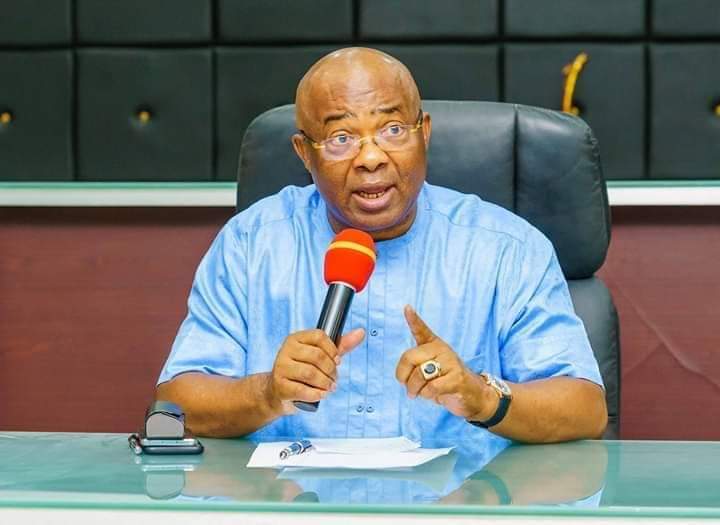The ‘Igbo question’, from Uzodinma’s lens
Once more another bold attempt has been launched pursuant to providing wider perspectives for placing in sharper context the engaging matter of the ‘Igbo Question’. Leading the charge this time is the Executive Governor of Imo State, Senator Hope Uzodinma who in a new book titled ‘Reflections on the Igbo Question’, has adopted a four-pointed […]

Governor Hope Uzodimma of Imo State
Once more another bold attempt has been launched pursuant to providing wider perspectives for placing in sharper context the engaging matter of the ‘Igbo Question’. Leading the charge this time is the Executive Governor of Imo State, Senator Hope Uzodinma who in a new book titled ‘Reflections on the Igbo Question’, has adopted a four-pointed framework to address the matter.
In the new 206-page book, the cerebral author and governor, who was once the Senator representing Imo West Senatorial District in the Nigerian Senate, tackles the matter from the angles of topical themes which dominate contemporary political discourse with respect to Ndigbo in Nigeria. His themes of choice are the incessant complaint of Ndigbo that they are marginalised in the scheme of things, their aspiration for a Nigerian President of Igbo extraction come 2023, the secession struggle (Biafra), and the hope of a restructured Nigerian federation which will avail them a level playing ground to compete favourably with other ethnic groups. Even with the most familiar acquaintance with the central thrust of political discourse in and about Igboland, it is difficult to identify any other theme beyond the foregoing that resonates more with the current sensitivities of the zone. In that context therefore, Uzodinma’s four angles of attack remain unquestionable as being right on target.
Seen from any perspective too, a book on Ndigbo by Senator Hope Uzodinma qualifies for attention anytime, given his pedigree and political antecedents. A former Youth Leader for Imo State under the defunct National Party of Nigeria (NPN), during the Second Republic (1979-‘83), and lately an elected Senator, he remains eminently qualified to offer quality intervention, especially when such a book is not dwelling on just one theme and is thereby limited in coverage to the immediate ambit of circumspection deriving from such a theme.
This book by Uzodinma, rather draws from his speeches which were delivered at various occasions and at different times in the course of his political career. It therefore captures his time-honed vision and convictions with respect to the four themes mentioned earlier. Hence the book prides itself as a composite package of his reflections on the Igbo Question, just as the title holds, and as conditioned by the effervescent political circumstances of the Nigerian public space. And who knows, the content could have had a nexus with his aspiration to serve Imo State (the heartland of Ndigbo), as a Senator earlier and eventually its Executive Governor for now. If that is the case, then availing the public of the benefit of his convictions through the new book, eminently qualifies it as a welcome intervention in the country’s political conversation, by an insider with undeniably rich insights, on the Igbo Question.
In a generic context, Uzodinma in his book appreciates and identifies with the misgivings of Ndigbo with respect to the uneasy interface between them and ‘Project Nigeria’ – a euphemism for the Nigerian nation in the context of her troubled developmental circumstances. In sympathy with his Ndigbo stock, he succinctly identifies with the underlying grudge of Ndigbo that since the end of the Nigerian Civil War in 1970, they have had to carry the burden of tacit denigration as less than bonafide citizens of the Nigerian nation. In fact, going by his take in the book, the entire gamut of grievances by Ndigbo as captured in the four point frame of his advocacy, derive from their common gut-feeling that they are yet to be fully integrated into the epicenter of the power circles of the country. In his submission, it is the sense of victimisation by the Nigerian state that has spawned the various faces of protest which manifest as the secessionist agenda of groups like IPOB, MASSOB and others, the clamor for a President of Igbo extraction in 2023, and the call for restructuring the country.
His point of departure from the Ndigbo separationists is the conviction that even with the misgivings of Ndigbo over their ‘maltreatment’ in the Nigerian polity, their future remains better guaranteed as a part of the nation, than as a separate political entity. To buttress his position Uzodinma argues in his book that Ndigbo have more to gain as part of the Nigerian federation than outside it.
Incidentally not a few Nigerians – even from outside Ndigbo ethnic stock are increasingly sharing the convictions of Uzodinma over the main features of the Igbo Question, along with efforts to facilitate a progressive approach to its resolution. The critical factors that justify Uzodinma’s advocacy are not far-fetched but remain basic considerations which a robust appraisal of the Igbo Question will easily illuminate.
Firstly Ndigbo are a component of the Nigeria federation which by their earlier consent remains ‘indivisible’. A succession campaign can only be possible through an amendment of the Constitution to incorporate the relevant provisions for secession.
Secondly a clamor for secession by Ndigbo needs a buy-in by their neighbours who are mostly the eastern minorities. So far there has been no record of a process to facilitate such a buy-in by neighbors to Ndigbo. Rather some more ambitious secessionist factors of Igbo extraction are manifesting tendencies that suggest an assimilate
Against the backdrop of the foregoing, especially with respect to the interest which Uzodinma’s advocacy may generate, it is clear that his take on the Igbo Question will spur further rounds in the country’s political conversation. And such is the welcome dose of illumination which it deserves to endear it to Ndigbo and ostensibly, the rest of the country.
